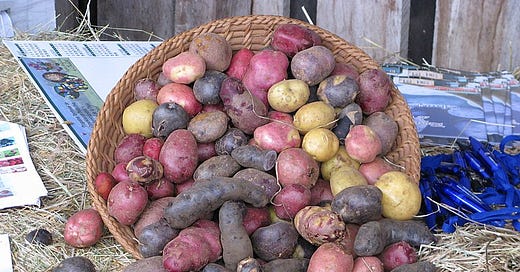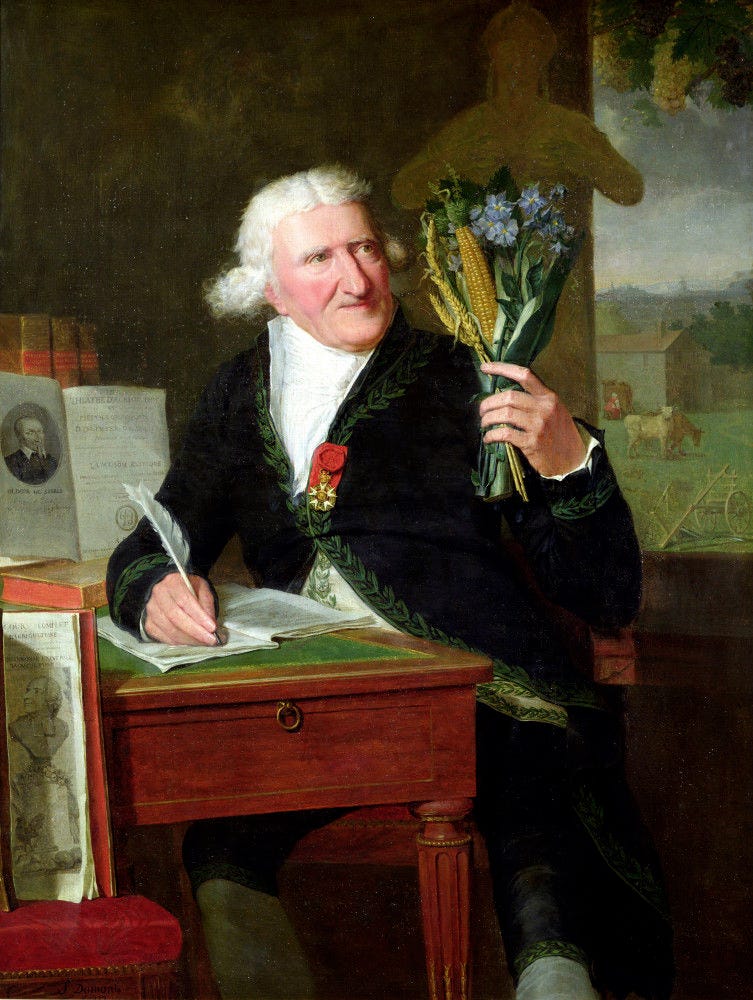The Potato - from Illegal in France to the Best Roast Potato
How potato was introduced in France, from being illegal to being served at every fancy aristocratic dinner and the best roast potato recipe
Did you know that the common potato actually comes from Peru and Bolivia, and was not introduced in Europe until the end of the 16th century, almost 100 years after the discovery of the Americas? You probably did.
How about the fact that it was illegal to grow potatoes in France? Until 1772, no less.
The potato in Europe was not off to a very good start.
At the time, there were clergymen who suggested that God did not intend for potatoes to be eaten because the Bible did not acknowledge them.
Botanists correctly identified them as belonging to the nightshade family of plants, which can contain a substantial amount of toxins that are inactivated by cooking, leading to a misguided link between potatoes and witchcraft or devil worship.
And finally, some herbalists noticed a similarity between the way potatoes look and the appearance of the hands of those suffering from leprosy. This led to the belief that potatoes could cause the disease.
Because of this confusion and fear, the French Parliament, in typical bureaucratic fashion - even back then - banned the cultivation of potatoes in France in 1748.
Meanwhile, in Germany, Frederick the Great, then king of Prussia, strove to overcome farmers' skepticism about the potato, and in 1756 he issued an official order mandating its cultivation. This Kartoffelbefehl (potato order) called the potato "a very nutritious food supplement." Frederick was sometimes known as the Kartoffelkönig ("potato king").
Back to France. Then came the Seven Years War (1756–1763), which was a global conflict that involved most of the European great powers. During this war, there was a French army medical officer called Antoine-Augustin Parmentier, who had been captured as a prisoner of war by the Prussians. During his imprisonment, he was fed a steady diet of potatoes. His experience changed the history of potatoes in France. He had eaten potatoes and survived, no leprosy, no other diseases.
When the war ended and he went back to France, Parmentier went through pharmacy training and started lobbying the Faculty of Medicine in Paris to change the status of potatoes, proving that they were not toxic in any way.
In 1773, he even won an award from the Academy of Besancon for research which proved that potatoes were a great source of nutrition for people suffering from dysentery.
With the permission of the King and Queen of France, he organised sumptuous dinners in which potatoes were served in every course. He invited renowned scientists, like Benjamin Franklin or Laurent Lavoisier (a French nobleman and chemist who had a large influence on both the history of chemistry and the history of biology). Queen Marie Antoinette even wore a headdress of potato flowers at a fancy dress ball.
The potato having thus been introduced to the higher class citizens of Paris, he then turned his focus on the poorer classes. In 1781, the King Louis XVI gave hime two acres (about 1ha) of land to grow potatoes, somewhere near Paris.
What he did was plant the potatoes and when the plants were getting close to being ready for harvest, he very publicly and loudly hired guards and placed them around the fields, to protect the precious crop. His thinking was that people would notice the guards and assume that potatoes must be valuable. Anything guarded so heavily must be worth stealing.

He then proceeded to instruct those guards to accept bribes and allow people to "steal" the potatoes. It worked like a charm, people started stealing his potatoes and in no time everyone started growing and eating potatoes. To the point where it helped France during the famine in the winter of 1788-1789. It was also promoted as “revolutionary food” by the Paris Commune during the French Revolution.
Parmentier died on 13 December 1813, at the age of 76. The famous and delicious “Hachis Parmentier”, a.k.a. Shepherd's Pie, is named after him. It is documented from the late 19th century. It is usually made with chopped or minced lamb or beef; in either case it may be made with either fresh or left-over cooked meat, with a layer of mashed potatoes on top. Also named after him is the recipe called "Potage Parmentier", which is potato and leek soup.
For this post, I will write you a recipe for roast potatoes. The best roast potatoes, by Jamie Oliver. I made these with some slight variations on the herbs used and received compliments for it every time. It's easy and delicious!

Ingredients:
2.5 kg medium potatoes
4 tablespoons fat or unsalted butter
olive oil
2 bulbs of garlic (you can use less if you want, in our family there is no such thing as too much garlic)
a few leaves of fresh sage (15g) or any other herb you think you will enjoy, like thyme or basil
Method:
Peel the potatoes, keeping them whole. Parboil them in a pan of boiling salted water for 15 minutes.
Drain and leave to steam dry for 2 minutes.
Place the fat or butter and 1 tablespoon of oil in your roasting tray. Add the potatoes, salt and black pepper, then toss to coat, and spread out in an even layer but with small gaps between them.
Get the garlic bulbs and lightly crush each unpeeled clove and add to the tray.
Roast for 1 hour in 180C/350F, or until the potatoes are crisp and golden all over.
Remove the tray from the oven. Gently half-squash each potato with a masher so they kind of push into each other and fill the tray.
Pick the herb leaves and – importantly – toss with a little olive oil. Sprinkle over the potatoes and roast for a further 20 to 25 minutes, or until golden.
As a side note, we planted our sage a few years ago, from a supermarket pot. We planted it in the garden and it has been growing ever since. We mostly kept it as a decorative flower bush, because it makes really pretty purple flowers, and we didn't know what to use it with really. So it's nice to have a use for it now :)







Potatos give us fries, mash, roast, vodka
It's like the other vegetables are not even trying...
Loved this! I’d never heard about potatoes banned in France, so it seemed extraordinary that millions of people in Ireland would become totally dependent on the crop. One of your most interesting posts ever 😊